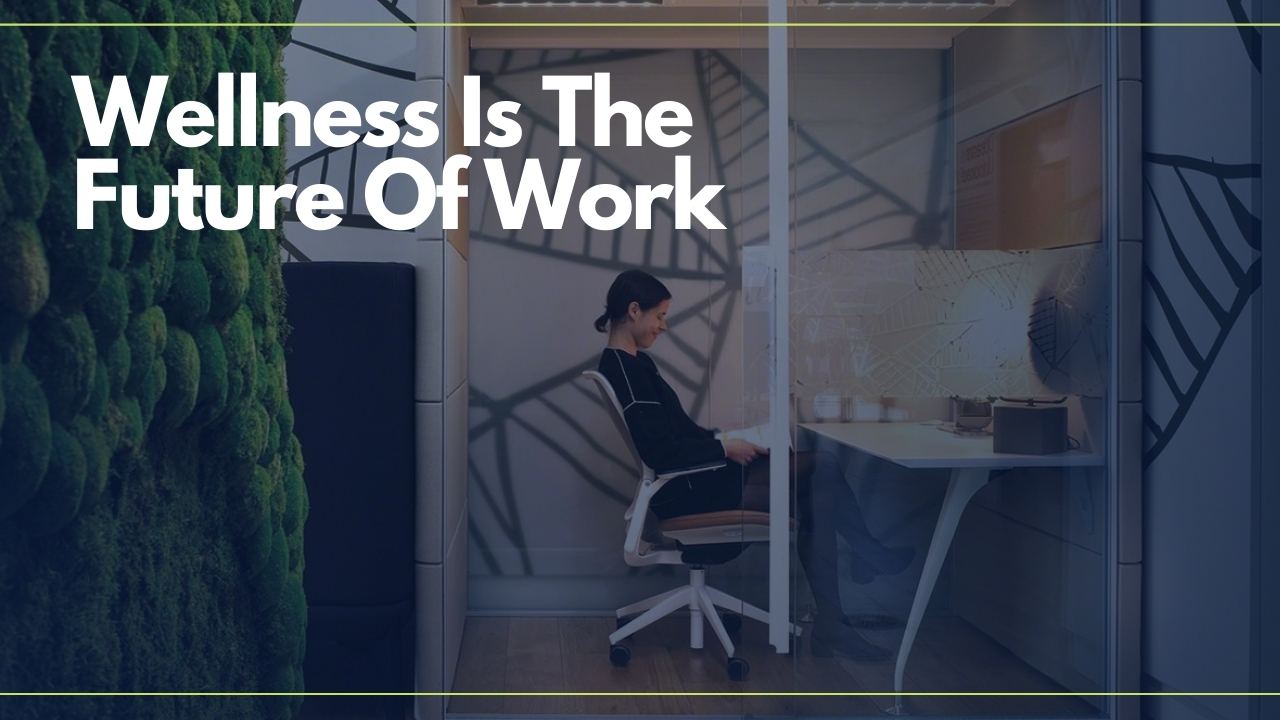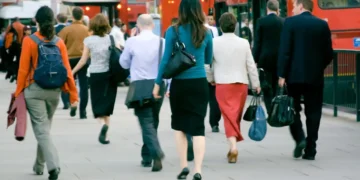- The overriding message from a recent virtual gathering was that “wellness is the future of work”.
- During the event, Laura Shook Guzman, David O’Coimin, and Philip Vanhoutte shared ideas and strategies on how to facilitate mental wellness in the workplace.
- Pods and booths can serve as little sanctuary spaces for introverts and people on the autism spectrum.
“Wellness is the future of work.”
That’s the overriding message from a recent virtual gathering of coworking minds, hosted by Cat Johnson and featuring three experts from the world of workplace wellness.
The event, one of a series of monthly Convos, took a deep dive into the current state of work and mental wellness at a time when we are emerging from the collective trauma of the coronavirus pandemic.
While the event focused on the link between wellness and coworking, it’s clear that any workspace, or any place that attracts a community or gathering of people, has the opportunity to create a safe space for conversations and support for mental health. But there is no single right or wrong approach; every person is different and has unique requirements.
With that in mind, Cat invited three guests to offer ideas and strategies on how to facilitate mental wellness in the workplace:
- Laura Shook Guzman – a somatic psychotherapist and cofounder of Women Who Cowork.
- David O’Coimin – founder and CEO of the DO Company and Nook Wellness Pods.
- Philip Vanhoutte – founder of Ozadi, author, public speaker, and a champion of smarter work.
Here are the highlights from the conversation.
Laura Shook Guzman: make time for yourself first.
Laura first led participants on a live mindfulness session, which set the tone for her advice on feeling well: first take care of you, before helping others.
As a founder and entrepreneur herself, she acknowledged that mental health for business owners and leaders is a struggle. “We are at higher risk because of uncertainty, financial risk, isolation, strain on relationships, sleep interruption, the ups and downs; all those things happen when we start a company, and it makes us vulnerable.”
Speaking from a career in mental health spanning 24 years, she explained that humans are incredibly resilient. Our body has been wired to protect itself, but it can also become maladaptive when we are in a situation where we do not feel safe.
Laura’s message is that it’s important to take care of yourself. Using the analogy of putting the oxygen mask on first before helping others, she said:
“As your members come back into your space, there is going to be more emotional labour, and you’re feeling their anxiety as well as your own. Before you focus on taking care of them, take some time for yourself. Really get your own needs met.”
She advised to take time to unplug, go into nature, and detox.
“Turn it off. Set those boundaries, get your own space, and do it unapologetically. Know that you will show up more for your members when you take this time for yourself.”
David O’Coimin: embrace neurodiversity and create safe spaces for everybody.
David’s entrepreneurial journey enabled him to experience and appreciate the different communities that we surround ourselves by, and the striking differences of the people within them. This eventually led him to create Nook, “a family of pods, booths and shelters; little sanctuary spaces, created originally for introverts and people on the autism spectrum.”
He created Nook to help people – including himself – find solace and escape from the challenges of busy open office environments.
These bustling, energetic open environments “evolved from the avatars of white middle-aged male extroverts”, in which the loudest prevail or to put it another way, the ‘squeakiest wheel gets the oil’.
Unfortunately, 50-75+ percent of the workforce do not function well in these spaces.
Workspaces can and need to be tuned in order to help us feel better, focus better, and engage better, said David. “They have a real strength and important role in that regard, and can help us to access our neurodiverse superpowers. This can help us build a wiser and more balanced community.”
Coworking is packed with neurodivergent minds. “It’s a world of beauty when you start to peel back what neurodiversity is.”
David explained that neurodivergence is an understanding of autism, dyslexia, ADHD, bipolarity, and other conditions, which are all part of the natural variations of the human brain. “Neurodiversity is our natural state, and to be neurodivergent is to have a diagnosis of a certain extremity of the spectrum that we’re all on.”
So, what can workspace operators do to create a more inclusive space for everybody?
David offered some tips and strategies to take forward:
- Create quiet spaces, such as little alcoves, sanctuary spaces, or rooms dedicated to quiet work. “As people walk into your space, they are interviewing the physicality of your space and looking for sanctuary spaces.” Make sure they see spaces that reflect their own needs.
- Make sure there are spaces where people can sit with their backs to the wall. This helps people feel safe, and it can have a profound impact on their mental state.
- Be mindful of not only creating for an avatar of yourself, or a reflection of your own personality and needs, but think about designing for extreme needs, too. Remember the phrase ‘Nothing about us, without us’ — this means don’t try to create an inclusive space for others without first talking to them and finding out what they need from you.
Philip Vanhoutte: Let’s build the foundations for people to do their best work.
Philip drew on research from Leesman research, which has been surveying 180,000 people over the past 15 months.
It revealed that working from home is rated as superior compared to working in offices by 30% of respondents, and productivity at home is also rated 20% better than in offices.
The distressing part is that 30% of people who work at home do not have a dedicated, closed space; they have a kitchen to work in, or a bedroom, or in some cases only a bathroom.
“We are in an unprecedented situation where we have both substandard offices, and substandard homes.”
Digging further into the research, Philip revealed that on a scale of 100, the office ranks a low 33 for noise reduction and focus rooms; 40 for temperature control and good air; and 35 for plants, nature and light.
“This is a license to fire facilities managers!” said David. These are basic requirements, yet “people still don’t get it.” Workplaces are failing their people on fundamental amenities like good quality air, and yet are still expecting them to work well in substandard conditions.
“We have to have buildings that are designed both for physical and mental wellbeing. My message is, let’s build the foundations for people to be able to do their work.” This is especially important now that many people are thinking about going back to work; those who face a poor quality office will prefer to work in a local coworking space that is designed for their needs.
“Are you clear yet about the opportunity for coworking?”
Sign up to Cat’s next Coworking Convo on June 25th to discuss how to attract leads to your workspace post-Covid. Convos are free, informal online events with workspace operators and coworking pros.



 Dr. Gleb Tsipursky – The Office Whisperer
Dr. Gleb Tsipursky – The Office Whisperer Nirit Cohen – WorkFutures
Nirit Cohen – WorkFutures Angela Howard – Culture Expert
Angela Howard – Culture Expert Drew Jones – Design & Innovation
Drew Jones – Design & Innovation Jonathan Price – CRE & Flex Expert
Jonathan Price – CRE & Flex Expert













